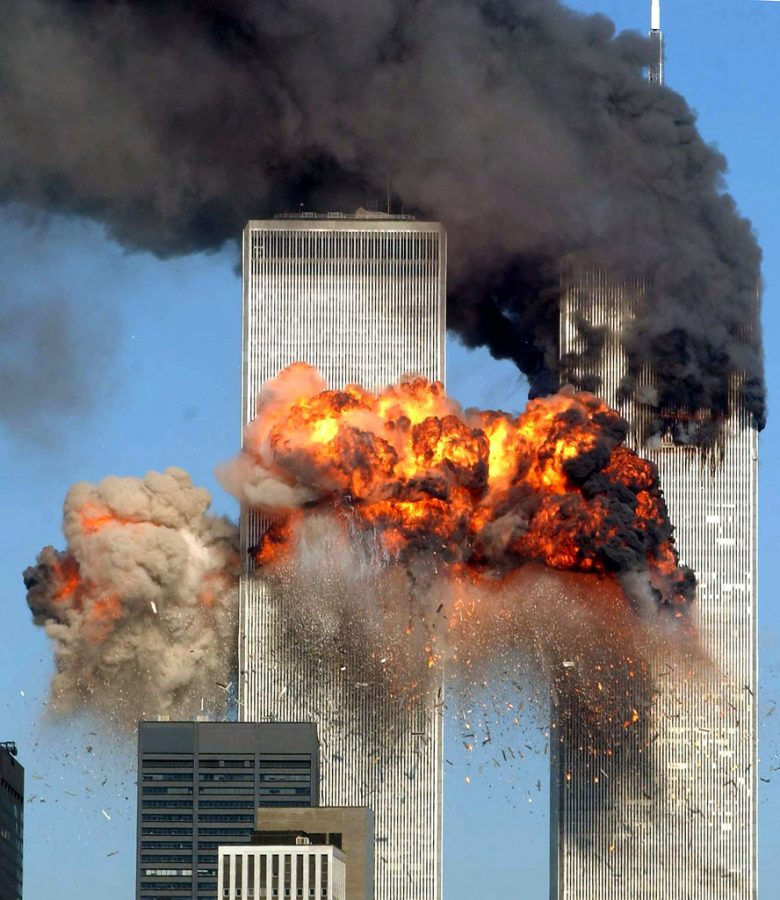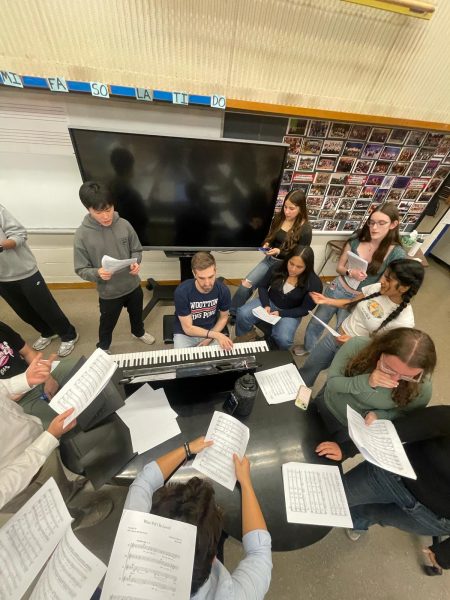How America has changed in the 20 years since 9/11
Cattias photos used with permission from Google Creative Commons
The World Trade Center’s North Tower, engulfed in flames moments after American Airlines flight 11 strikes.
9/11. The phrase quickly became shorthand for the terrorist attacks that shocked the conscience of America. Twenty years ago, the Twin Towers fell, a plane crashed into the Pentagon and the goal of a plane hitting the U.S Capitol was averted by the passengers of American Airlines Flight 93, who took back the plane from hijackers, crashing it into a field in Pennsylvania.
In response to this tragedy, President George W. Bush’s administration began two wars without exit strategies. Both were costly in both lives and dollars, while stripping away freedoms at home in the name of fighting for them overseas. Both wars were arguably unnecessary and indisputably filled with corruption, and the Iraq war was reprehensibly built on a lie.
Perhaps the most egregious infringement on civil liberties was the Patriot Act, which would become law less than two months after 9/11. The 4th amendment to the Constitution makes it clear the government cannot conduct a search without obtaining a warrant and showing probable cause to believe that person has committed or will commit a crime. The law’s very name is Orwellian, furthering the notion that if you didn’t support this president, this administration and this war, you weren’t a patriot.
The law allowed “Sneak and peek” searches, in which law enforcement could search a person’s home, apartment or office while they are away. They would also be permitted to not tell the person who they were searching until later, according to the ACLU.
The Patriot Act gave FBI agents the ability to issue National Security Letters (NSLs).These letters could be used to obtain phone records, computer records, as well as credit and banking history. The egregious part of this practice is that these letters do not require a judge’s approval. Probable cause was abandoned in the name of national security.
The Patriot Act was only effective at taking away privacy, not its stated purpose of catching terrorists. Even if the victim of an NSL is innocent, information found with an NSL does not have to be destroyed. Between 2003 and 2006, the FBI issued 192,499 NSLs, leading to approximately one terror-related conviction, according to the Science of Security.
The FBI made 53 criminal referrals to prosecutors using NSLs from 2003-2005. Nineteen of these referrals involved fraud, and there were 17 apiece for cases involving immigration and money laundering, with zero related to terrorism. The only true success of the Patriot Act was assembling a massive collection of illegally obtained information about American citizens.
One of the more despicable fronts of the war on terror was Guantanamo Bay, a detention camp in Cuba. That location is crucial in its role to avoid and obfuscate the responsibilities of the Constitution. People suspected to be terrorists would be brought to Gunatanmo, without being told what they were being accused of or given a trial. According to Georgetown Univeristy, “the torture included but was not limited to waterboarding, sexual harassment and abuse, physical abuse, and sleep deprivation. Those formerly imprisoned still experience physical and psychological distress and trauma as a result of their treatment in Guantánamo Bay.”
In Guantanamo Bay, there are military tribunals where suspects are denied the rights they would receive in America. Additionally, of the 779 prisoners kept in Guantanamo, there have been just eight convictions in these unconstitutional military commissions, according to the ACLU. Just under 40 men remain in Guantanamo, with no trial or release in sight
Just four days after 9/11, a vote was held to authorize use of force against those responsible for attacking America. Out of every single member of Congress, only one politician voted against a resolution that would become a blank check financing both the Bush administration’s unconstitutional actions as well as a larger War on Terror.
The lone member of Congress with the foresight and ability to critically think about the effects of military action was Democrat Barbara Lee. She believed force was not the solution to the 9/11 attacks, and that during a time of mourning for the country, stepping back and thinking about the implications of America’s actions was crucial. Her closing statement, “as we act, let us not become the evil that we deplore,” was prophetic in forecasting the unimaginable cost of the Afghanistan War.
A common mistake Americans make is assuming history begins on Sept. 11. American involvement in Afghanistan traces as far back as the 1950s during the post World War II era. Support from America and the Soviet Union escalated as the decades passed, leading to a Soviet invasion in 1979.
This would prove costly as just two years after the end of their withdrawal in 1989, the Soviet Union would fall. During this conflict, America armed the mujahideen to fight the Soviet Union. Many of these fighters would later become part of the Taliban, a group that would take over Afghanistan in the ‘90s and install Sharia Law, an incredibly strict interpretation of Islam, that essentially bars women from society.
Afghanistan also became a training ground of sorts for terrorists. Among terrorist leaders was Osama Bin Laden, the man who organized the 9/11 attacks. These attacks spurred the spirit of vengeance, leading to a two-month campaign that toppled the Taliban. After the forming of an interim government, Bush claimed “mission accomplished” in 2003.
In order to maintain the system America had created, extended troop presence was needed. Military personnel would remain in Afghanistan, with the goal of training Afghan security forces to resist the Taliban. This endeavor was a massive, expensive failure costing trillions of dollars and hundreds of thousands of lives, most of which were Afghan civilians.
The effort was for naught as the Taliban recently took Afghanistan in a few weeks time. It’s important to mention the failures of this war were not the brave men and women serving in a war zone, but the leaders who made the rushed decision to commit such a massive military presence.
Nearly immediately after the military presence in Afghanistan began, war hawks in the Bush Administration, and Bush himself, began shifting focus to the grand prize, Iraq, the home to some of the world’s largest oil reserves. Even before 9/11, the White House had held meetings about seizing Iraqi oil.
The primary reason given to justify Iraqi invasion was the supposed weapons of mass destruction Iraqi leader Saddam Hueisein had. Despite every attempt by Huissein to prove there were no weapons, including over 700 inspections, America would invade in 2003 with the authorization of Congress. This was a bipartisan failure, with a significant number of Democrats joining Republicans in voting for an unwise invasion. This unrest would later lead to the rise of ISIS.
The American invasion of Iraq toppled a stable, if dictatorial, regime and replaced it with violent civil war. The ignorance of America led Dick Cheney, who served as vice president at the time, to proclaim America would be “greeted as liberators”. Tragically, America did not understand the country we were invading.
Government officials believed that Sunnis and Shia, different types of Muslims, could coexist, when the only time that had happened was during the 950s, according to Britannica. That isn’t a typo. America’s costly strategy for a sustained democracy in Iraq rested on groups that had last shared power peacefully more than a thousand years ago.
This was a shameful era for mainstream media, as they served as a mouthpiece for pro-war government propaganda, and refused to question shaky-at-best claims that Saddam Huessein had weapons of mass destruction. At best they were ignorant, and at worst they were eager to push the same narrative.
New York Times reporter Judith Miller was one of the more shameful actors in this calamity. In late 2004, the New York Times issued an apology for their initial Iraq War coverage. Judith Miller wrote or co-wrote 10 out of 28 of those stories. She remains adamant she did not do anything wrong.
War profiteering became particularly egregious during the post 9/11 wars. According to Brown University, more than half of the Department of Defense budget now is spent on military contractors and payments to contractors have risen more than 164% since 2001, from about $140 billion in 2001 to about $370 billion in 2019.
These large military contacts were often used for “private contractors,” who are in practice soldiers, but officially private employees. Many details about these private contractors, such as the number of deaths remain closed off to the public and allow the military to hide the true impact of war.
It is impossible to discuss the military industrial complex without mentioning Former Vice President Cheney. He had been the CEO of Haliburton, a oil services and engineering company from 1995 until the presidential election in 2000. Haliburton relied heavily on military contracts. From just 2000-2003, Haliburton rose from the 22nd to seventh largest military contractor, with their ex-CEO as one of the most influential vice presidents in American history.
President Dwight Eisenhower, who served as the Supreme Commander of the Allied Expeditionary Force during World War II, famously warned of the military industrial complex during his farewell address. A situation like Cheney’s was what horrified him. A supposed public servant shamelessly intertwined with a private military company and used their influence to become wealthier. According to the New York Times, Cheney received just under $2 million from his election as VP to 2004.
America made many mistakes in the path it blazed post 9/11. However, we can remember those who made sacrifices for our country. We can also draw lessons from our failures. Among these lessons are understanding that military action should never be the first option, having the moral courage to stand up for what is right, even when it isn’t convenient, and that “uniting” around an emotional yearn for revenge in the aftermath of tragedy is not something to aspire to as a nation.
Your donation will support the student journalists of Thomas S. Wootton High School. Your contribution will allow us to purchase equipment and cover our annual website hosting costs.
Ethan is a 2023 graduate.







![The 2025-2026 Editorial Board Alex Grainger, Cameron Cowen, Helen Manolis, Emory Scofield, Ahmed Ibrahim, Rebekah Buchman, Marley Hoffman, Hayley Gottesman, Pragna Pothakamuri and Natalie Pak (Chase Dolan not pictured) respond to the new MCPS grading policy. “When something that used to be easy suddenly becomes harder, it can turn [students’] mindset negative, whereas making something easier usually has a better impact. I think that’s where a lot of the pushback comes from. But if you put emotions aside, I do think this change could help build stronger work ethic,” Ibrahim said.](https://woottoncommonsense.com/wp-content/uploads/2025/09/fqr5bskTXpn0LRQMmKErLuNKdQYBlL726cFXBaWF-600x450.jpg)